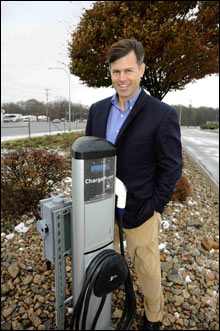
‘NOT A CAR GUY’ Dahlberg at the charging station at Cardi’s in West Warwick. |
“I’m not a car guy,” says Al Dahlberg, sitting in his office on a recent afternoon.It seems an odd admission, coming from Rhode Island’s chief evangelist for electric vehicles. But for Dahlberg, next-generation plug-in cars like the Nissan Leaf and Chevy Volt are much more than the latest in whiz-bang technology.
For Dahlberg, the vehicles are nothing less than America’s best chance to confront the central economic and national security challenge of our time: weaning ourselves off foreign oil and declaring energy independence.
And Rhode Island, he maintains, is well positioned to lead this radical shift in how we consume energy.
The major knock on the electric vehicle, after all, is its limited range — the Leaf, which goes on sale in five states next month and is slated to land here next fall, can only roam 100 miles before a recharge is required. And little Rhody excels, if nothing else, at going small.
“We’re a tiny state, densely populated,” says Dahlberg. “We don’t like to drive to Newport, never mind leave the state.”
Dahlberg — a bright, well-trimmed lawyer who heads up Project Get Ready Rhode Island, the local affiliate of a nationwide network of electric vehicle advocates — is the first to acknowledge that Western states like California, Oregon, and Washington are in the vanguard of the movement.
But the local effort, with no budget to speak of, has done quite a bit since it launched 16 months ago: building a coalition of environmentalists, engineers, and car dealers; winning an active partner in electric utility National Grid; working with Cardi’s Furniture to install the state’s first public car-charging station outside the company’s West Warwick store.
Brown students have charted the rough outlines of a sprawling, public charging infrastructure. And Rhode Island Speaker of the House Gordon Fox has joined with Providence Mayor David Cicilline in signing a memo-randum of understanding with Project Get Ready.
Dahlberg, a Brown University lobbyist by day, is thinking big: large-scale, mainstream adoption in Rhode Island — and across the country — in the next 15 to 20 years. Indeed, anything less would be failure. “I am not interested in plug-in electric vehicles being a niche product,” he says, leaning forward in his chair. “If they are, this is a total waste of my time.”
THE NATIONAL DRIVE
The success of the local effort depends, in large part, on the nation’s place in the electric vehicle race. And the United States, at the moment, is trailing.
Steep gas taxes in Western Europe have led to speedier adoption of the cars there. And China is planning a $15 billion investment in the vehicles — what New York Times columnist Thomas Friedman calls a game-changing “moon shot” — as part of a broader attempt to become a world leader in green technology.
But the engine is starting to rev here. The Obama Administration announced $2.4 billion in grants for electric car and battery development last year. ECOtality, a San Francisco-based company, is setting up a network of 15,000 public charging stations in 16 metropolitan areas with the help of $115 million in federal stimulus funds. And the electric vehicle push is one of the few major initiatives that may actually go somewhere in the newly divided Washington.